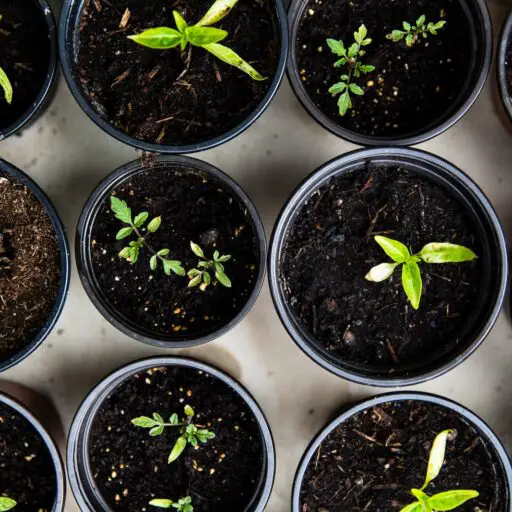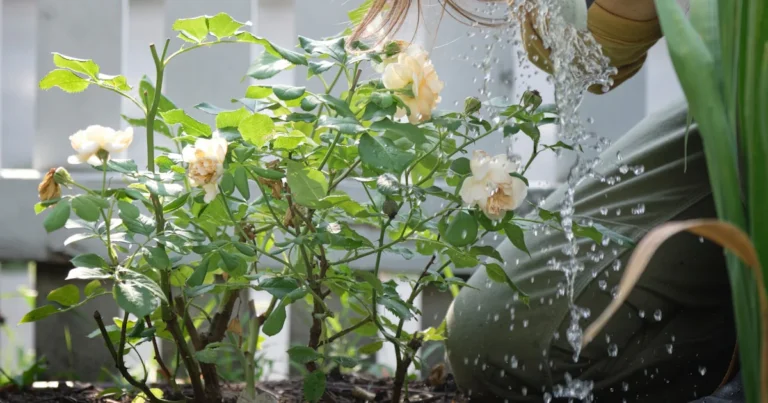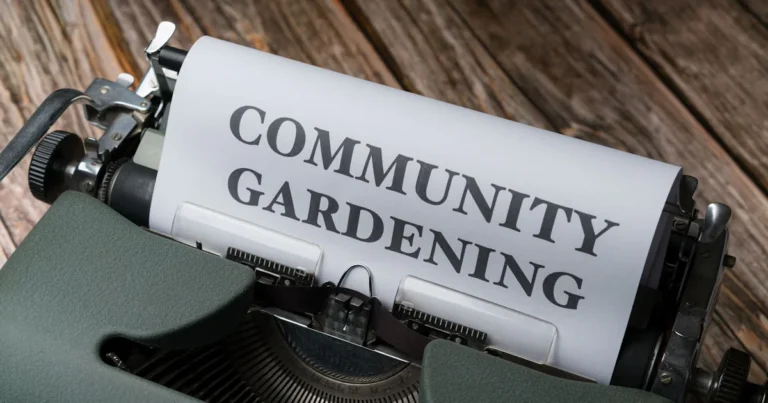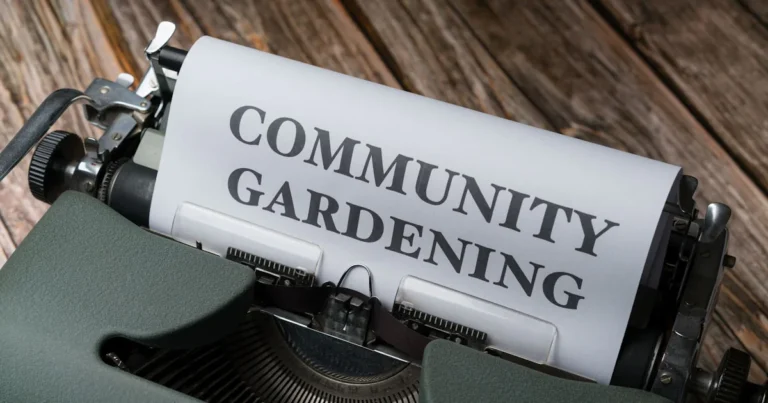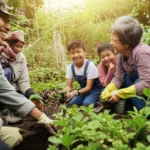Support our educational content for free when you purchase through links on our site. Learn more
Imagine a place where tomatoes, laughter, and friendships grow side by side—a vibrant patch of earth that does more than just feed your body; it nourishes your soul and your neighborhood. Community gardens are exactly that magical space. But how exactly do these green oases build social connections that transform strangers into friends and neighborhoods into thriving communities?
In this article, we dig into 7 powerful ways community gardens cultivate social bonds, from fostering intergenerational friendships to serving as cultural crossroads. You’ll discover inspiring stories, science-backed benefits, and practical tips to help you start or join a garden that grows more than just plants—it grows community. Ready to uncover the secret social fertilizer? Let’s get growing!
Key Takeaways
- Community gardens increase social capital by creating shared spaces that encourage regular interaction and mutual support.
- Shared goals and collaborative gardening strengthen teamwork and neighborhood bonds.
- Gardens serve as inclusive cultural hubs, promoting diversity and intergenerational exchange.
- Mental health benefits include reduced stress and decreased social isolation.
- Challenges like power imbalances exist, but can be overcome with inclusive governance and open communication.
- Starting or joining a garden is easier than you think—with step-by-step guidance and resources available.
Ready to design your garden for connection? Check out tools like the Gardena Garden Planner and heritage seeds from Seed Savers Exchange to get started!
👉 Shop gardening essentials:
- Gardena Garden Planner: Amazon | Gardena Official
- Seed Savers Exchange Seeds: Amazon | Seed Savers Official
Table of Contents
- Quick Tips and Facts About Community Gardens and Social Connections 🌱🤝
- Roots of Togetherness: The History and Evolution of Community Gardens as Social Hubs 🌿📜
- Why Community Gardens Are More Than Just Green Spaces: Building Social Capital and Trust 🌼💬
- 1. How Community Gardens Foster Friendships and Neighborhood Bonds 👩🌾👨🌾
- 2. The Role of Shared Goals and Collaborative Gardening in Strengthening Social Ties 🌻🤲
- 3. Community Gardens as Safe Spaces for Cultural Exchange and Inclusion 🌍🌸
- 4. Intergenerational Connections: How Gardens Bridge Age Gaps 🌱👵👦
- 5. Mental Health and Well-being Benefits: Growing Happiness Together 😊🌿
- The Science Behind Social Gardening: Research Insights and Case Studies 🔬📊
- Community Gardening Success Stories: Real-Life Tales of Connection and Empowerment 🌟📖
- How to Start or Join a Community Garden That Builds Social Connections: A Step-by-Step Guide 🛠️🌻
- Tools, Resources, and Organizations Supporting Socially Connected Community Gardens 🧰🌐
- Overcoming Challenges: Navigating Conflict and Diversity in Community Gardens ⚠️🌿
- Quick Tips for Maximizing Social Connections in Your Community Garden 🌟🌻
- Conclusion: Growing Stronger Together—The Lasting Impact of Community Gardens on Social Bonds 🌳❤️
- Recommended Links for Further Exploration and Inspiration 🌐📚
- FAQ: Your Burning Questions About Community Gardens and Social Connections Answered ❓🌿
- Reference Links and Credible Sources to Dig Deeper 📖🔗
Quick Tips and Facts About Community Gardens and Social Connections 🌱🤝
If you’re wondering how community gardens build social connections, you’re in the right place! At Community Gardening™, we’ve seen firsthand how digging in the dirt can grow friendships, trust, and a sense of belonging. Here are some quick nuggets to get you started:
- ✅ Community gardens increase social capital by creating shared spaces where neighbors meet, collaborate, and support each other.
- ✅ Gardening together boosts mental health and combats loneliness, as shown by studies linking green space interaction to reduced stress and depression (source).
- ✅ Shared goals in gardening foster teamwork and a sense of accomplishment, which strengthens community bonds.
- ✅ Community gardens serve as cultural exchange hubs, welcoming diverse backgrounds and traditions.
- ✅ Intergenerational gardening connects youth and elders, passing down knowledge and creating mutual respect.
Want more? Keep reading to uncover the roots of these social benefits and how you can cultivate them in your own neighborhood garden!
For a deeper dive into the benefits, check out our article on 5 Benefits of a Community Garden.
Roots of Togetherness: The History and Evolution of Community Gardens as Social Hubs 🌿📜
Community gardens aren’t just pretty patches of green; they’re historical powerhouses of social connection. Since the late 19th century, urban dwellers have reclaimed vacant lots and unused land to grow food, flowers, and friendships.
The Origins and Growth
- Victory Gardens of WWI and WWII: Citizens grew their own food to support the war effort, creating a shared mission that united communities.
- 1960s and 70s Urban Renewal: Community gardens emerged as grassroots responses to urban decay, crime, and food deserts.
- Post-2009 Recession Boom: A 19% increase in community gardens reflected a renewed hunger for connection and sustainability (source).
Gardens as Social Catalysts
These green spaces became “spheres of sociability” where people from different walks of life could meet, share resources, and build social capital. They weren’t just about plants—they were about people.
Want to see how this plays out today? Keep an eye out for our success stories section!
Why Community Gardens Are More Than Just Green Spaces: Building Social Capital and Trust 🌼💬
You might think a garden is just dirt and plants, but it’s actually a living network of relationships. Here’s why:
- Social Capital: The connections and trust built among gardeners translate into stronger neighborhoods. When people know and trust each other, they’re more likely to help out in times of need.
- Community Resilience: Gardens foster a sense of belonging that helps communities bounce back from crises—whether economic, environmental, or social.
- Shared Ownership: When everyone has a stake in the garden, it encourages responsibility and cooperation.
Research shows that gardens encourage sharing of resources and knowledge, which boosts community capacity (source). It’s like a social fertilizer!
1. How Community Gardens Foster Friendships and Neighborhood Bonds 👩🌾👨🌾
Nothing beats the magic of planting seeds and watching friendships grow alongside your tomatoes! Here’s how community gardens nurture social ties:
- Regular Interaction: Weekly or daily visits create natural opportunities for chatting, helping, and bonding.
- Shared Celebrations: Harvest festivals, potlucks, and garden workdays build camaraderie.
- Mutual Support: Gardeners exchange tips, tools, and even emotional support, creating a safety net.
Personal Story: One of our gardeners, Maria from Chicago, told us how she met her best friend through their community garden plot. “We started swapping seeds, then recipes, and now we’re planning a garden-to-table dinner together!”
Want to create these bonds? Start by organizing a simple meet-and-greet or a seed swap in your garden.
2. The Role of Shared Goals and Collaborative Gardening in Strengthening Social Ties 🌻🤲
Community gardens thrive on shared purpose. When people work together toward a common goal, social connections deepen.
How Shared Goals Help:
- Collective Problem-Solving: Facing pests or drought together builds teamwork.
- Division of Labor: Assigning roles (watering, weeding, composting) fosters interdependence.
- Visible Progress: Watching the garden flourish motivates continued collaboration.
Tip: Use a community board or app to coordinate tasks and celebrate milestones. This keeps everyone engaged and accountable.
3. Community Gardens as Safe Spaces for Cultural Exchange and Inclusion 🌍🌸
Community gardens are melting pots where cultural traditions bloom alongside basil and kale.
- Cultural Crop Sharing: Gardeners grow heritage plants like callaloo, calabaza, or native herbs, preserving traditions (source).
- Language and Storytelling: Gardens become informal classrooms where stories and languages are exchanged.
- Inclusive Design: Raised beds, wheelchair access, and multilingual signage welcome diverse participants.
Community Gardening™ Tip: Host cultural potlucks or garden tours to celebrate diversity and foster inclusion.
4. Intergenerational Connections: How Gardens Bridge Age Gaps 🌱👵👦
One of the most heartwarming aspects of community gardens is how they connect generations.
- Youth Learning from Elders: Older gardeners pass down knowledge about plants, cooking, and life lessons.
- Youth Energy and Innovation: Younger gardeners bring fresh ideas, tech-savvy tools, and enthusiasm.
- Mutual Respect: Working side-by-side builds empathy and breaks down age stereotypes.
Our own volunteer coordinator, James, recalls a project where local teens taught seniors how to use gardening apps, while seniors shared heirloom seed stories. “It was a win-win that blossomed into lasting friendships.”
5. Mental Health and Well-being Benefits: Growing Happiness Together 😊🌿
Gardening isn’t just good for your body—it’s a balm for the soul.
- Stress Reduction: Time in green spaces lowers cortisol levels and calms the mind (source).
- Combatting Social Isolation: Community gardens provide meaningful social contact, reducing loneliness.
- Sense of Purpose: Caring for plants and contributing to a community project boosts self-esteem and happiness.
Fun Fact: A UK study showed just 30 minutes of gardening a week improved self-esteem and lowered stress (source).
The Science Behind Social Gardening: Research Insights and Case Studies 🔬📊
Let’s geek out for a moment! Here’s what science tells us about community gardens and social connections:
| Study / Source | Key Finding | Link |
|---|---|---|
| PMC Article (2021) | Gardens build social cohesion but also reveal power dynamics and inequalities | PMC |
| Community Psychology (2017) | Gardening increases happiness and community connectedness | Community Psychology |
| Project for Public Spaces (2019) | Green spaces reduce crime and improve social trust | PPS |
Key Takeaways:
- Community gardens boost social capital but require attention to inclusion and power imbalances.
- Shared gardening improves mental health and happiness.
- Gardens reduce neighborhood crime by fostering community cohesion.
Community Gardening Success Stories: Real-Life Tales of Connection and Empowerment 🌟📖
We love sharing stories from the trenches! Here are a few highlights:
- Queen Anne Memorial Garden, Seattle: This garden revitalized a declining neighborhood but also sparked conversations about inclusion and power dynamics (source). It’s a reminder that gardens can be both unifiers and mirrors of community challenges.
- Little Haiti Garden, Miami: Haitian immigrants grow traditional crops, share cultural knowledge, and run workshops, creating a vibrant social hub (source).
- Fresno, CA Gardens: State-funded gardens support refugees and immigrants, boosting mental health and social resilience.
Your Turn: What stories could your garden tell? Start documenting your garden’s journey to inspire others!
How to Start or Join a Community Garden That Builds Social Connections: A Step-by-Step Guide 🛠️🌻
Ready to get your hands dirty and your social life blooming? Here’s how:
-
Find or Form a Group
Connect with neighbors, local nonprofits, or municipal programs. Check platforms like LocalHarvest or your city’s parks department. -
Choose a Site
Look for vacant lots, schoolyards, or church grounds. Ensure access to water and sunlight. -
Define Goals and Rules
Decide if the garden will focus on food, flowers, cultural crops, or all of the above. Create guidelines for participation, plot assignment, and maintenance. -
Design the Garden Together
Use inclusive design principles—raised beds, accessible paths, communal spaces. -
Organize Community Events
Kick off with a planting day, potluck, or seed swap to build relationships. -
Maintain Communication
Use newsletters, social media, or apps like Nextdoor to keep everyone connected. -
Celebrate and Reflect
Host harvest festivals, share stories, and evaluate what’s working.
Pro Tip: Partner with organizations like American Community Gardening Association for resources and support.
Tools, Resources, and Organizations Supporting Socially Connected Community Gardens 🧰🌐
To help your garden thrive socially, here are some go-to tools and allies:
| Resource | What It Offers | Link |
|---|---|---|
| American Community Gardening Association (ACGA) | Networking, toolkits, advocacy | ACGA |
| Nextdoor App | Neighborhood communication | Nextdoor |
| Seed Savers Exchange | Heritage seeds and cultural crop info | Seed Savers |
| Garden Planner by Gardena | Easy garden design software | Gardena |
| Local Cooperative Extension Services | Expert advice and workshops | Search your state’s extension |
👉 CHECK PRICE on:
- Gardena Garden Planner: Amazon | Gardena Official
- Seed Savers Exchange Seeds: Amazon | Seed Savers Official
Overcoming Challenges: Navigating Conflict and Diversity in Community Gardens ⚠️🌿
Not every garden grows without weeds—sometimes social weeds creep in too.
Common Challenges:
- Power Imbalances: Some voices dominate decision-making, marginalizing others (source).
- Cultural Misunderstandings: Different gardening traditions or communication styles can cause friction.
- Access Issues: Locked gates or restrictive rules can exclude community members.
- Resource Conflicts: Competition for plots, water, or tools may arise.
How to Address Them:
- Inclusive Governance: Create diverse leadership committees and transparent decision-making.
- Conflict Resolution Training: Offer workshops or bring in mediators.
- Open Communication: Regular meetings and anonymous feedback channels help surface issues early.
- Celebrate Diversity: Host cultural events and encourage sharing of traditions.
Remember, challenges are opportunities for growth—both for your garden and your community!
Quick Tips for Maximizing Social Connections in Your Community Garden 🌟🌻
Before we wrap up, here are some quick, actionable tips from our Community Gardening™ experts:
- Host Regular Social Events: Potlucks, workdays, and celebrations keep spirits high.
- Create Shared Spaces: Benches, bulletin boards, and tool sheds encourage interaction.
- Use Technology: Group chats and social media keep everyone in the loop.
- Encourage Storytelling: Share gardeners’ stories in newsletters or on social media.
- Be Welcoming: Greet newcomers warmly and offer mentorship.
- Celebrate Successes: Highlight garden milestones and individual contributions.
Want more inspiration? Check out our Community Garden Events category for ideas!
Ready to dig deeper? The next sections will cover how to make your community garden a true social powerhouse and provide resources to keep you growing strong!
Conclusion: Growing Stronger Together—The Lasting Impact of Community Gardens on Social Bonds 🌳❤️
Wow, what a journey through the vibrant world of community gardens and their incredible power to build social connections! From historical roots to modern-day success stories, it’s clear that these green spaces are so much more than just places to grow veggies—they’re living, breathing hubs of community, culture, and care.
We’ve explored how community gardens foster friendships, encourage collaboration, celebrate diversity, and bridge generations. We’ve also tackled the challenges that come with shared spaces and how thoughtful governance and inclusive design can turn potential conflicts into opportunities for growth.
Remember Maria’s story? That seed swap blossomed into a lifelong friendship. Or the Queen Anne Memorial Garden, which taught us that while gardens can unite, they also reveal social complexities we must address with openness and equity.
So, what’s the final word? If you want to grow your social network, boost mental well-being, and cultivate a stronger, more resilient community, starting or joining a community garden is one of the best moves you can make. It’s a hands-on, heart-opening way to dig into your neighborhood’s potential.
Ready to get growing? We’ll leave you with plenty of resources and answers to your burning questions below. Let’s keep the conversation—and the connections—flourishing! 🌿✨
Recommended Links for Further Exploration and Inspiration 🌐📚
Looking to gear up or get inspired? Here are some top picks from Community Gardening™:
-
Gardena Garden Planner
-
Seed Savers Exchange Heritage Seeds
-
American Community Gardening Association (ACGA)
-
Books to Dig Into:
FAQ: Your Burning Questions About Community Gardens and Social Connections Answered ❓🌿
What role do community gardens play in fostering social connections among residents?
Community gardens act as social magnets by providing a shared space where residents regularly interact, collaborate, and support each other. They create opportunities for casual conversations, teamwork, and cultural exchange, which build trust and a sense of belonging. Studies show that these interactions increase social capital and community resilience, making neighborhoods safer and more vibrant (source).
How can community gardens be designed to promote social interaction and a sense of community?
Design matters! Gardens that include communal seating areas, accessible pathways, shared tool sheds, and community boards encourage gardeners to linger and connect. Incorporating inclusive features like raised beds for accessibility and multilingual signage welcomes diverse participants. Hosting regular social events and collaborative projects further strengthens bonds. Using tools like the Gardena Garden Planner can help design spaces that maximize social interaction.
What are the benefits of intergenerational community gardening for building social connections?
Intergenerational gardening bridges age gaps by fostering mutual learning and respect. Elders share gardening wisdom and cultural traditions, while youth bring energy and innovation. This exchange combats age-related stereotypes and promotes empathy. It also helps preserve heritage crops and knowledge, enriching the community’s cultural fabric. Our experience shows these connections often blossom into lasting friendships and mentorships.
Can community gardens help reduce social isolation and improve mental health in urban areas?
Absolutely! Spending time in green spaces reduces stress hormones and improves mood. Community gardens add the social element, combating loneliness by providing meaningful interactions and a sense of purpose. Studies, including a UK research project, found that even 30 minutes of gardening weekly can lower anxiety and boost self-esteem (source). For urban residents, these gardens are vital oases of connection and calm.
How do community gardens address power imbalances and ensure inclusivity?
While community gardens have immense potential, they can reflect existing social inequalities. Addressing this requires inclusive governance, transparent decision-making, and active outreach to marginalized groups. Avoiding exclusive practices like locked gates or restrictive plot assignments is crucial. Encouraging diverse leadership and hosting cultural events helps ensure the garden serves the whole community equitably (source).
What are some practical ways to maintain long-term social engagement in community gardens?
Sustaining social connections means keeping the garden dynamic and welcoming. Organize regular events like potlucks, workshops, or seasonal festivals. Use communication tools like newsletters or apps (e.g., Nextdoor) to keep everyone informed. Celebrate milestones and individual contributions publicly. Offering mentorship for newcomers and rotating leadership roles can also keep energy high and participation broad.
Reference Links and Credible Sources to Dig Deeper 📖🔗
- Beyond Food: Community Gardens as Places of Connection and Empowerment — Project for Public Spaces
- Social Dynamics and Subplots in Community Gardens — PMC Article
- Community Gardens Promote Connection to Others — Community Psychology
- American Community Gardening Association — ACGA
- Seed Savers Exchange — Seed Savers Official
- Gardena Garden Planner — Gardena Official
We hope this guide has inspired you to dig deep into the social soil of community gardening and cultivate connections that last a lifetime. Happy gardening and growing together! 🌻🌿
